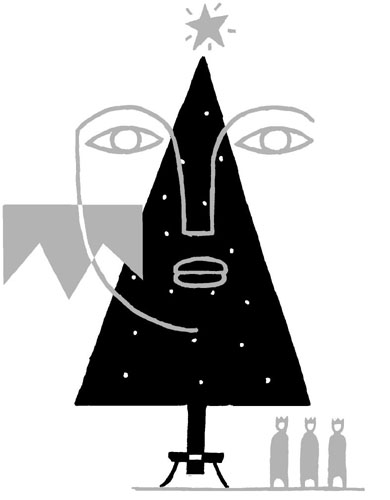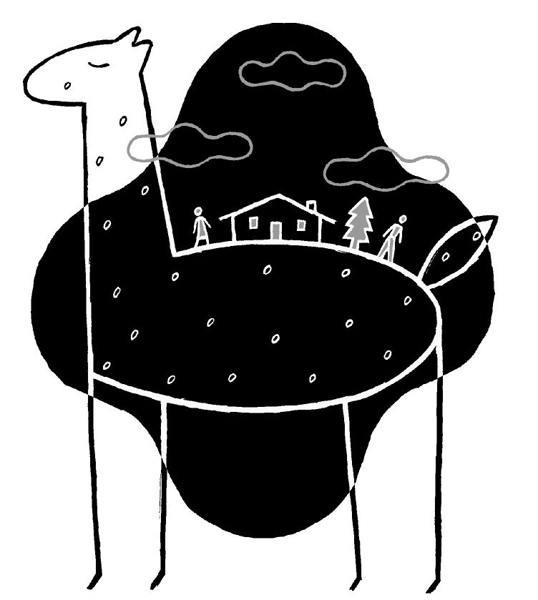Las Christmas (3 page)

The next night the
velorio
began. The road was full of jeeps and city cars, and more dressed-up relatives than ever before spilled out of the little house. For three days people ate and drank and prayed and partied, laughing and chatting, catching up on old gossip and rekindling ancient family arguments. Now and then someone would have to separate a couple of drunk men preparing to hit out with fists. Several of the women had
ataques,
falling to the ground and tearing their hair and clothing.
The first night of the
velorio
was also the first night of Hanukkah that year. While Tata went to church with her mother to take part in
rosarios
and novenas and Catholic mysteries I knew nothing about, my family sat in the darkened living room of our house and lit the first candle on the menorah, the one that lights all the others. Gathered around that small glow, my father told the story of the Maccabees who fought off an invading empire, while, across the road, Tata's family laughed together, making life bigger than death. I remember sitting around the candles, thinking of those ancient Jews hanging in for thirty years to take back their temple, what it took to not give up; and of all the women in the barrio raising children who sometimes died and you never knew who would make it and who wouldn't, of people setting off for home and maybe meeting death in another jeep along the way. And in the middle of a bad year, a year of too much loss, there were still two big pots of
pasteles
and a house full of music and friends. Life, like the
acueducto,
seemed to be unpredictable, maddening, and sometimes startlingly abundant.
That night I lay awake for a long time in the dark, listening to life walking toward me. LuÃs would never come home from Vietnam or would come home crazy, but the war would end someday and most of us would grow up. My father would be fired from the university for protesting that war, and we would be propelled into a new life, but I would find lifelong friends and new visions for myself in an undreamed-of city. Death and celebration, darkness and light, the miraculous star of the Three Kings and the miracle of a lamp burning for eight days on just a drop of oil. So much uncertainty and danger and so much stubborn faith. And somewhere out there in the dark, beyond the voices of Tata's family still murmuring across the road, the three wise mysterious travelers were already making their way to me, carrying something unknown, precious, strange.
Puerto Rican
Tostones con Mojito

FRIED PLANTAINS
Tostones
are served year-round in Puerto Rico, where no party is complete without them. Traditionally, they are pressed with the heel of the hand; modern cooks can find wooden
tostoneras
in Latin American groceriesâor even at the San Juan airport.

Add 2 tablespoons salt to 2 cups water. Set aside. Peel plantains. Cut in rounds about 1½ inches wide. Place slices in salted water for ten minutes. Drain.
Heat 2 inches of oil in a deep frying pan. The oil should be hot but not smoking.
Place plantain slices on a slotted spoon and dip into the hot oil. Fry over moderate heat until plantains are soft, about 8 minutes.
Remove slices from the pan with the slotted spoon onto paper towels. Allow to drain and cool slightly.
Press fried slices between sheets of waxed paper using a rolling pin or use a
tostonera.
The slices should be about ½ inch thick when pressed. The thinner you press them, the crispier they'll become.
Make a fresh batch of salt water, again using 2 tablespoons of salt to 2 cups of water. Dip fried pressed slices in fresh salted water quickly, remove and drain.
Fry again, about 5 minutes, or until crispy. Remove with slotted spoon to paper towels and drain again. Serve warm, salted, plain or with
mojito.
Makes
20
to
30
tostones, depending on the size of the plantains

Combine ingredients. Use as a dip.

Junot DÃaz
Junot DÃaz was born and raised in Santo Domingo, the Dominican Republic.
His story collection,
Drown,
was published in English by Riverhead Books, and
in Spanish (under the title
Negocios
) by Vintage Español. His work has appeared
in
The New Yorker, Best American Fiction, Story,
and
The Paris Review.
THE THREE KINGS LOSE THEIR WAY

I DON'T REMEMBER WELL my first Christmas in the States. My family left Santo Domingo in mid-December. I was seven that year and vaguely recall celebrating Three Kings Day early, perhaps even on the day of our departure from the island. My mom wasn't leaving anything up to chance; she'd rather us children celebrate our holiday weeks early in Santo Domingo, our home, than save it for a land she did not know and did not, instinctively, trust. I remember receiving a plastic canteen, a tin top, and a plastic machine gun, none of which survived more than a month in the States. The machine gun might even have been my brother's. He was older, and I'd never known him to have much interest in toysâhe was in the habit of passing all his shit to me or my little sister.
My green card dutifully reports that I arrived at Kennedy Airport on the eleventh of December with the rest of my family. I am scowling in my green-card picture, a small serious boy who, in an effort to please his military father, buttoned all his shirts to the top. My attempt to ingratiate myself with my pops is not as important as my expression: Although the photo was snapped in a backroom studio in Santo Domingo, it best predicted what I would feel like when, upon debarking from the plane, I experienced a New York winter for the first time in my life. The December winds plowed me open. We didn't even have coats and wouldn't have them until we reached our apartment in New Jersey. My father had forgotten to bring them to the airportâand where the hell would my family have found them in Santo Domingo?
I remember my first weeks in the States as a series of astonishments: the cold, my father, English, our apartment, the indoor plumbing, the TV, the loneliness of apartment life, of being a recently arrived immigrant. I not only had to acclimate myself to our new surroundings, but also to my father's presence. He was a man I'd previously only heard stories about. But now he was with us, an intense, complicated presence.
In those first weeks, Christmas must have been everywhere around usâ on the TV, on the radio, in the stores where we shopped for the socks and toothbrushes our family would need in order to become like
los americanos
(a metamorphosis my father regarded very seriously). I suspect I took it for granted that this was what the United States was about, that all the colors, the clamor, and the decorations were part of every day, that stores were always flooded with waves of anxious, frantic, irritated customers. I was overwhelmed by it all. As for the much-anticipated snow, we saw a lot of it on the television, a bewildering, accumulating whiteness, but we wouldn't have any in our part of the state until late the next month. On the twenty-second of December, my brother and I watched through a window while a neighbor in the next building rigged his porch with beautiful strings of Christmas lights. We lived across from Mr. Polanca for twenty years, and he never once changed his routine. The brother was like clockwork. The tree went up on the twentieth, the lights on the twenty-second. And it all came down on the seventh of January.
That year, Christmas came and went. I remember plenty of things from those first weeks but not that day specifically. I remember sneaking out of the apartment one night, while my parents were sleeping, to check out everybody's lights in the neighborhood; I remember that my brother and I got lost, and it took us nearly three freezing hours to find our way back to our apartment in the dark. I remember my birthday on the thirty-first of December and the flimsy Hess trucks my father brought us for Three Kings Day, but I don't remember Christmas. I must have been too caught up in my adaptations to take much notice. The next year would be a different story. By then, my siblings and I would speak English. No longer Nabokov's dreaded monolinguists, ours would be mongrel tongues. We'd also have enough “American” culture inside of us to accord the appropriate amount of approbation to the holiday of Christmas. It would never again slip by unnoticed, but Three Kings Day would, which says a lot more about what we lost in coming to the States, I think, than about what we gained.

